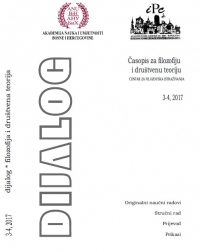Nominalizam – paradigma kontroverzi od Ockhamova intuicionizma do Hobbesove filozofsko-političke teorije
Nominalism, Paradigm of Controversy From Ockham’s Intuitionism to Hobbs’s Philosophy of Political Theory
Author(s): Zdravko PerićSubject(s): Political Philosophy, Philosophy of Middle Ages, Early Modern Philosophy
Published by: Akademija Nauka i Umjetnosti Bosne i Hercegovine
Keywords: W. Ockham; universal concepts; nominalism; intuitionism; conventionalism; natural state; political philosophy;
Summary/Abstract: Generally, when we want to share the thoughts about Hobbes or have a discussion, there is a doubt what a premise to take, in order to reach our final opinion, regardless how well we know his philosophy. The obstacles we might face interpreting his philosophy are not only subjective ones. This paper shows some incoherences in Hobbes’s philosophical linguistical topics. In spite of them, the interest to study his philosophy, as well as philosophy civilis or materialistic empiric one, does not run short. The topics presented in this work are only implicitly mentioned in his works. However, although these topics are not explicit, they are not less important. On the contrary, discussing them further we understand Hobbes’s philosophy better and get deeper into its meaning. For instance, if we know that Hobbes was a nominalist, who denied the existence of universal concepts, we can see better his ontological empirical materialism. Besides, it points out his anthropological individualism which brought about a new interpretation of a human being. His new interpretation of a human being is a novelty in comparison to scholastic tradition and Aristotel’s definition of a human being as a social being (ζῷον πολιτιϰόν). The paper emphasizes the influence of Ockham’s intuitional nominalism on Hobbes’s nominalism. Des¬pite the fact that Hobbes rejected Ockham’s intuitional nominalism, due to its methodological and ontological unacceptability and wanted to start his new epistemology and politics, we find his conceptualism. Nevertheless, the main representative of conceptualism was Ockham. The conceptualism is present in Hobbes’s work, although it is not consistent with his nominalism. Some philosophers after Hobbes argued that he was ultra-nominalist, even bigger than Ockham. The paper shows that some ultra-nominalistic ideas, besides conceptual ones, can be found in Hobbes’s philosophy. Discussing these ideas and comparing them in the paper, we find out more about Hobbes’s philosophy. These linguistic topics are not only important for philosophy, but also influenced strongly classical and modern literature, as can be seen in the paper.
Journal: Dijalog - Časopis za filozofiju i društvenu teoriju
- Issue Year: 2017
- Issue No: 03+04
- Page Range: 67-100
- Page Count: 34
- Language: Croatian

